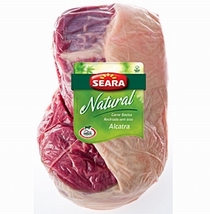 TNC, a leading conservation organization, Marfrig Group, one of the world’s largest food producers, and Walmart Brazil, the world’s leading retailer, will provide technical resources to promote compliance with environmental legislation and expand responsible production among ranchers operating in the municipalities of São Félix do Xingu and Tucumã, located in southeastern Pará, a state in Brazil’s North Region. The objective is to ensure the conservation of these regions’ forests, soil and rivers, while expanding the supply of beef with assured origin to Brazilian consumers using an enhanced beef tracking system.
TNC, a leading conservation organization, Marfrig Group, one of the world’s largest food producers, and Walmart Brazil, the world’s leading retailer, will provide technical resources to promote compliance with environmental legislation and expand responsible production among ranchers operating in the municipalities of São Félix do Xingu and Tucumã, located in southeastern Pará, a state in Brazil’s North Region. The objective is to ensure the conservation of these regions’ forests, soil and rivers, while expanding the supply of beef with assured origin to Brazilian consumers using an enhanced beef tracking system.Southeastern Pará was the area chosen for the project because of its high potential for conservation and its growing economic importance based primarily on cattle production. The region concentrates forests, which are distributed across conservation units, indigenous reservations and private properties, as well as rivers of fundamental importance to the entire Amazon Region, such as the Xingu River and its affluents. The region is also situated on one of Brazil’s most dynamic agricultural frontiers. São Félix do Xingu, for example, is the Brazilian municipality with the largest cattle herd in the country, according to the Brazilian Geography and Statistics Institute (IBGE), and concentrates 1% of the national herd.
“TNC has been working in this region for four years and on various fronts. We expect to build a production model that reconciles the biome’s conservation and that can be replicated in other areas of the Amazon to generate results on a large scale," says Ian Thompson, director of the Amazon program at TNC.
Meanwhile, Tucumã is the municipality where one of Marfrig Group’s production units is installed, which has the capacity to process 1,000 head of cattle per day but has been idle since 2009. The company decided to re-open it this year, and the measures required for its reopening include mapping and organizing cattle suppliers based on the company’s social and environmental criteria adopted throughout its production units. Marfrig Group’s sourcing system allows the purchase of cattle only after verifying the environmental licensing and tax status of the producer, checking if the rancher is on the list of violators published by Brazil’s environmental agency Ibama, and super-imposing the images of the georeferenced properties with satellite maps of deforested areas, among other measures.
“This engagement with Walmart Brazil and TNC is fundamental for encouraging more and more rural producers to adopt sustainable practices on their ranches and comply with the responsible management standards that are implemented throughout our entire production platform in Brazil, which is unprecedented in the industry,” says James Cruden, chief executive officer of Marfrig Beef, the business segment of the Marfrig Group dedicated to beef production.
Improvements from end to end
The new projects will further a more sustainable cattle production chain. Over the last five years, government, companies and non-governmental organizations have implemented significant measures to improve environmental practices in the industry, as demonstrated by the previous commitments undertaken by Marfrig Group and Walmart Brazil to not process or sell beef products that cause deforestation. Now, the engagement of all links in the production chain working on the same objective and in the same region should open up new conservation opportunities and establish new and higher standards of sustainability in beef production.
Without these initiatives to provide technical support to ranchers and deforestation control at the municipal level, as proposed by the project, it would be impossible to supply companies and supermarkets with responsible products on a scale that could make a difference. Meanwhile, for rural producers, the involvement of the entire production chain reinforces the idea that adhering to environmental practices has become not only a required environmental stance, but also a key prerequisite for gaining access to important markets.
“Sustainable products must also be accessible to our clients in terms of quantity, price and quality. Achieving these objectives requires a commitment by the entire chain. Only in this way will we be able to give consumers an opportunity to buy products of proven origin,” says Camila Valverde, sustainability director for Walmart Brazil.
The project should help the retailer to reach one of its global sustainability targets for 2015 of having all beef sourced from the Amazon Region coming from ranchers that comply fully with legal requirements and adopt responsible practices.





